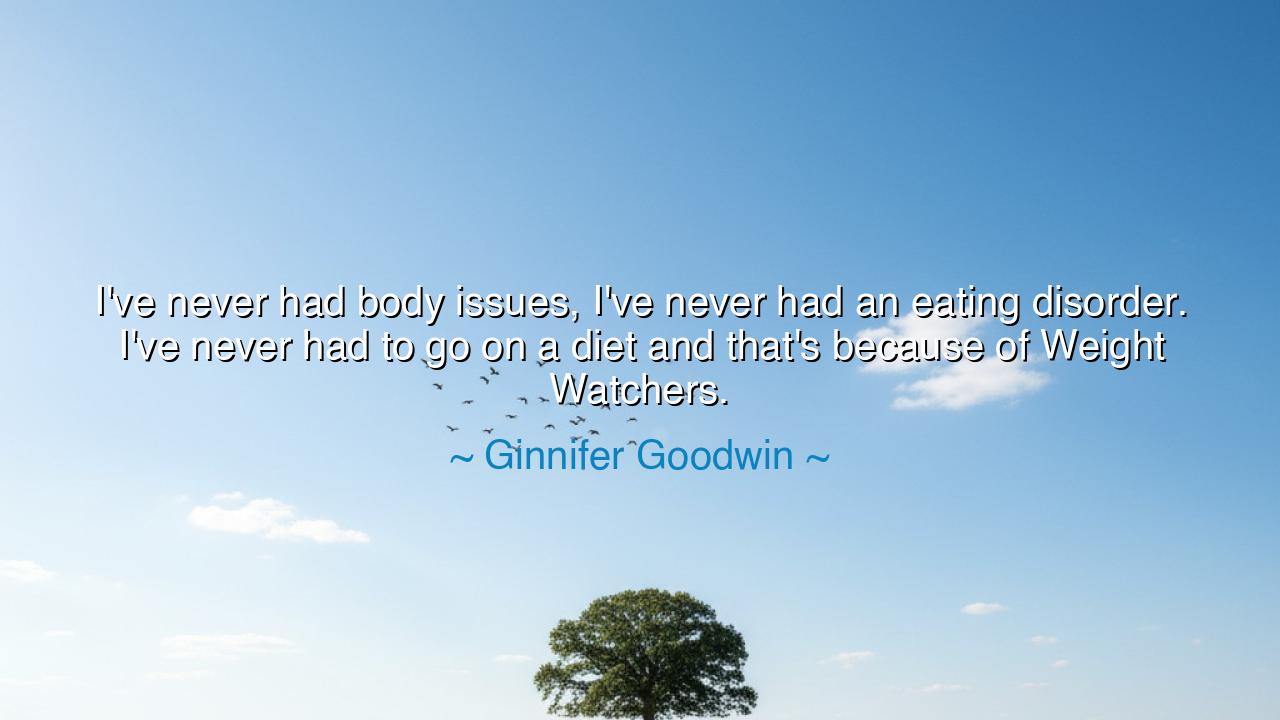
I've never had body issues, I've never had an eating disorder.
I've never had body issues, I've never had an eating disorder. I've never had to go on a diet and that's because of Weight Watchers.






When Ginnifer Goodwin declared, “I’ve never had body issues, I’ve never had an eating disorder. I’ve never had to go on a diet and that’s because of Weight Watchers,” she was not simply praising a program—she was giving voice to a deeper truth about balance, awareness, and self-respect. Her words speak to a philosophy that transcends food or fitness; they are about living in harmony with one’s body rather than in war against it. For in an age obsessed with perfection, her statement shines as an ancient kind of wisdom: the art of moderation and the freedom that comes from living with mindfulness rather than restriction.
The ancients understood this harmony well. The philosopher Epicurus, often misjudged as a hedonist, taught that pleasure must be guided by wisdom, that true joy lies not in excess but in measured enjoyment. He believed that to live well, one must understand one’s own needs and never be enslaved by desire. So too does Goodwin’s approach reflect this principle. She does not seek control through denial, nor indulgence through impulse; rather, she finds peace through conscious discipline. The beauty of her message lies in its simplicity—health not as punishment, but as partnership between body and mind.
In saying she has “never had body issues,” Goodwin reminds us of a rare and precious strength: the ability to look upon oneself without contempt. From the earliest civilizations, this harmony of the self has been seen as the root of all virtue. The Greeks called it sophrosyne—the divine balance of self-knowledge, restraint, and serenity. To see one’s reflection and feel neither pride nor shame, but acceptance, is among the greatest victories a human can achieve. For how many wars are fought, not between nations, but within our own flesh and mind?
The reference to Weight Watchers, though modern, carries the spirit of ancient discipline cloaked in contemporary form. It is not the brand itself that holds the power, but the principle it embodies—accountability, community, and mindfulness. In the same way that the Stoics gathered in fellowship to discuss virtue and temperance, modern individuals gather to share the struggle for balance. Goodwin’s gratitude is not to a company, but to a structure of wisdom that turns chaos into clarity. It is the acknowledgment that no person finds balance alone; even the strongest benefit from guidance and shared purpose.
We can see reflections of this philosophy throughout history. The story of Athenaeus of Naucratis, a scholar of ancient feasts, tells how even the most lavish banquets of Greece were governed by rules of balance and measure. There were moments for indulgence, yes, but always tempered by mindfulness—a recognition that food, like life, was meant to be savored, not conquered. When Goodwin speaks of never needing to “go on a diet,” she invokes this same truth: that sustainability is nobler than severity, and that true wellness arises not from deprivation, but from understanding.
In her declaration that she has “never had an eating disorder,” there is an echo of both strength and compassion. She acknowledges not superiority, but gratitude—for she lives in peace with something that torments so many. Her words remind us that disorder begins where disconnection begins—when one’s perception of self grows distorted by fear or comparison. The ancients would say that such disconnection is the loss of harmony between the soul and its vessel. To restore it requires gentleness, not punishment; education, not condemnation. This is the quiet wisdom within Goodwin’s statement: the belief that healing begins with respect for the body’s truth.
So let this quote serve as a lesson to all who hear it: that health is not a battle, but a relationship. To live well, one must listen—to hunger, to fullness, to the quiet signals that sustain life. Make choices with awareness, not anxiety. Eat not as an escape, but as an act of gratitude. Seek systems and communities that support mindfulness, not obsession. For the body, when treated with kindness, responds not with rebellion but with strength.
And thus, the teaching of Ginnifer Goodwin stands as both modern and timeless: that freedom from shame and obsession is not found in extremes, but in balance. The body is not a burden to be tamed, nor an idol to be worshipped, but a companion to be understood. To live in harmony with it is to live as the ancients taught—with moderation, mindfulness, and grace—and in that harmony, one finds not only health, but peace.






AAdministratorAdministrator
Welcome, honored guests. Please leave a comment, we will respond soon